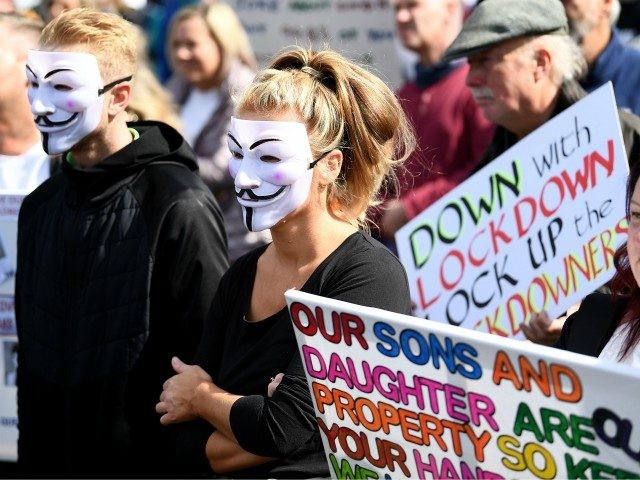Brexit Party leader Nigel Farage has predicted that law-abiding Britons will defy the prime minister’s new coronavirus restrictions after months of witnessing far-left protests and illegal raves.
On Wednesday, Prime Minister Boris Johnson announced that because of a rise in confirmed cases of coronavirus, from Monday a new law will prevent gatherings of more than six people in public or private. Police will be given the power to disperse, fine, and even arrest those who break the rules.
Reacting to the news, Mr Farage remarked that the average Briton will not abide by this “draconian” curtailment of his freedoms after having witnessed Extinction Rebellion and Black Lives Matter protesters gather with impunity.
Social gatherings of more than six people will be illegal in England from Monday.
Brexit Party leader Nigel Farage: "I think people are going to break it. The government have lost respect on this".
Watch on YouTube ► https://t.co/ssa0Fwgvk5@danwootton | @Nigel_Farage pic.twitter.com/PZY4CJs7IZ
— talkRADIO (@talkRADIO) September 9, 2020
Speaking to talkRADIO’s Dan Wooton on Wednesday evening, Farage said: “There’s a feeling amongst the law-abiding majority that we’ve become very weak on some sections of the community, and tough on others.”
When the law comes into effect on Monday, “I think people are going to break it wholesale. The government, frankly, has lost respect on this.”
The Brexit Party leader said that while the Conservative government has claimed to be ‘following the science’ in its decision making, he said that he does not believe ‘the science’ is backing up these new restrictions.
“More people are being diagnosed because of more testing,” Mr Farage pointed out. His observation is backed by Wednesday’s report by the BBC on the rising numbers, which asserts that “extra testing is a factor.” The broadcaster noted that earlier in the year, testing could only be undertaken of patients in hospital, whereas now capacity is more widespread, enabling testing in the community.
“So while cases may be rising, the level of infection being seen is still very low compared with the peak,” the broadcaster said. Other factors in the rising numbers that the BBC pointed to was that testing is being focused on known virus hotspots, meaning authorities are more likely to find positive cases. The BBC also noted that hospital admissions are not rising as fast as cases. While young people are testing positive at higher rates, they are less likely to become seriously ill, the report noted.
You Could Be Arrested for Breaking New Coronavirus Rules, Says Boris https://t.co/CU15C4gnbz
— Breitbart London (@BreitbartLondon) September 9, 2020
“We’re really got to the point where the government is putting the precautionary principle above the long-term wellbeing of the country,” Mr Farage warned, noting that while large corporations are stable, many self-employed people are suffering.
“We see the gap between the rich and the poor getting wider. We see the gap between those with private education and state education getting wider. We see a country that needs to be told that however difficult this is, we’ve got to get on with the rest of our lives.”
He added that while it was regrettable that certain people with medical conditions must take additional measures to keep well, however, “we can’t close the whole country down. We just cannot go on doing that.”
While Prime Minister Johnson claimed that these measures were in place to prevent a second lockdown, Mr Farage said that he feared “that these draconian restrictions that are coming in from Monday are the beginning of another lockdown and that would be a complete and utter disaster”.
Johnson’s plans also outlined the introduction of “Covid-secure marshalls”. While ministers are yet to outline their roles, Mr Johnson suggested they would be patrolling city centres to stop people from getting too close to one another.
The media reported on Thursday that the six-person rule could drag on until Christmas, without a legally-permitted return to normality until Spring 2021.
PM: In ‘Near Future’ Britain, Staff Will Have to Take Coronavirus Tests Daily to be Allowed to Work, Socialise https://t.co/FYYnljxo3L
— Breitbart London (@BreitbartLondon) September 9, 2020

COMMENTS
Please let us know if you're having issues with commenting.